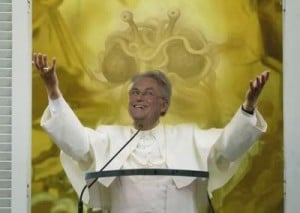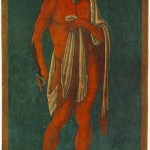For four years, I spent time hanging out with atheists at The Ohio State University. I started a group called The Thomas Society (after St. Thomas the Doubter) where everyone was welcome. Our weekly meetings often consisted of atheists, agnostics, Christians, Jewish rabbis, and an odd assortment of students from campus. As I look back on it, I realize this sort of thing doesn’t happen much.
During the meetings, I adopted a “no question off limits” and “no edit policy” with only one rule; you couldn’t attack another person. Needless to say, our meetings DID NOT resemble a Campus Crusade meeting. Students would often cut loose and lay out a stream of profanity that would make a drunk Irish Catholic blush. At the same time, all of them felt safe. Many aired their grievances to Christianity, some of them profound hurt done to them by churches.
On top of all this emotional turmoil, the intellectual discussion in those meetings always stunned me. I don’t agree with those who think that kids today are stupid. They’re not. They lack direction, vision, and a place to really grow. No one, including their parents, are teaching them what really matters in life. All they get from our narcissistic and broken generation is the need to “make money.”
Along with those meetings, I started hanging out with hardcore atheists. These weren’t your mother’s atheists. No, they were true disciples of Dawkins and Hitchens. None of them bothered hiding their contempt for the church and for Christianity. As you might expect, they pushed me constantly about my faith, asking questions, and challenging me to go deeper.
Many people used to ask me, “Does time with the atheists ever hurt your faith?” I understand the question. It’s natural. Yet, there is an undercurrent there that I find vaguely insulting to myself and to atheists. The assumption is that hanging out with atheists will somehow weaken your faith. Such thinking is cowardly at best, and blatant disobedience to Christ at worst.
Yet, I can honestly say, yes, the atheists did affect my faith; they made me a Catholic.
A bold statement, to be sure, but it is so. Why?
Being with atheists, if you’re really engaged with the experience, forces you to question everything you really believe and hold dear. Indeed, atheists are some of the most honest people I know. That isn’t to say they don’t practice their own brand of gross self-deception, just like the rest of us. Rather, they seek to blow that self-deception away in themselves. Granted, they do so in a way that often blows out a good part of their thinking ability due to simplistic skepticism, but the whole point is they try.
 This honesty started to challenge not my faith, but the staunch Protestantism I painted over myself to seem acceptable to my family and friends. I could recite my Protestant Catechism (Scripture Alone, Faith Alone, etc) with the best of them. Indeed, being a smart guy, I could defend it better than most. That is the beauty of being trained by Presbyterians; you become a theological and intellectual debate ninja.
This honesty started to challenge not my faith, but the staunch Protestantism I painted over myself to seem acceptable to my family and friends. I could recite my Protestant Catechism (Scripture Alone, Faith Alone, etc) with the best of them. Indeed, being a smart guy, I could defend it better than most. That is the beauty of being trained by Presbyterians; you become a theological and intellectual debate ninja.
Further, being with atheists fed my life long desire to find a home, to find a place where I fit in somewhere. When I was a Charismatic, I never fit in because I was constantly told (by my own parents even) that I “think too much and read too much.” On the other hand, my Presbyterian friends in college and seminary always held me at arms length because they sensed some sort of strangeness about me and some of my “theological views.”
I can’t blame either group for holding me at arms length. I didn’t belong to either, but I tried to pretend that I did. What I started to realize is that in my youthful, desperate search to fit in somewhere, I attached myself to any group that came along. I wanted attention. I wanted to be home. I wanted to be somewhere where I felt like I belonged.
I realized that I tried to pretend and be a chameleon all my life. I’d morph for the Charismatics, morph for the Presbyterians, and morph for what everyone wanted me to be, including my own family. Everyone needed me to be strong and I tried to pretend that I was.
Inside, I was dying, lost, afraid, and felt homeless. I believed in Christ with all my heart, but I let my own brokenness drive me further away from Him. Finally, I realized I needed to stop lying to myself. This sounds like a simple thing, doesn’t it? Lying to oneself is the easier thing in the world to do, but also the hardest thing to quit. No doubt, it was double for me because my whole life was built around the lie I’d built for myself.
Yes, atheists made made me question a lot of my accepted conservative Evangelical Protestant beliefs. I realized that Scripture alone was not only an absurd doctrine, but also, in fact, the Bible didn’t teach it. St. Paul is very clear that scripture and God’s people have a very symbolic relastionship. As a Protestant, I was completely blind to the fact I still interpretated scripture through my own stunted, historical lens. Question. Question. Question until I found myself starting to attend a Catholic church last year on a regular basis.
When I did, I realized what I’d been missing; an emotional home. All that had been torn from me when I was a child came roaring back with a force that left me breathless. I’ve had Protestant friends press me for theological reasons for my decisions. I have them and I’ll talk about that in the last two essays. However, I want it to be understood, my decision came from my emotions first, and the justification came later. For once, I wanted to be home. I got tired of wandering, feeling lost, and afraid. I was tired of trying to do my faith on my own, which, if Protestants are honest, are what lies at the core of their beliefs, no matter how much they talk about community. That sounds harsh, but I don’t mean it to be in anyway. I have many Protestant friends who love Jesus and I love them. I would never say to them they must come over to the Catholic church to be “true Christians.”
In the end, being with atheists helped me on my journey to find the peace I longed for and the home I desperately needed. For that alone, I’m grateful for my time with them and praise God for the grace they provided for me. Although they probably would protest at that assumption, it is the truth. Thank you, atheists, for making me truthful and helping me stop being a consummate liar. You helped me find my home again. I’ll light a candle for you next time I go to mass












